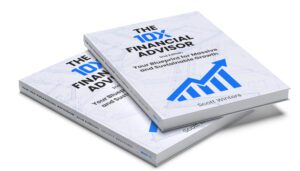When my daughter was in high school, she went through a phase where she’d come home after a tough day and give me the classic parent test: the heavy sigh, the long silence, the “nothing’s wrong” while clearly everything was wrong. Early on, I made the rookie mistake of responding like a financial advisor with a spreadsheet—trying to solve the problem with logic. “Well, if you just focus on your homework and ignore the drama, you’ll be fine.” Shockingly, this did not produce the desired bonding moment.
It took me a while to learn that what she wanted wasn’t a solution—it was empathy. She didn’t need me to fix it. She needed me to listen, nod, and sometimes say nothing at all. Once I figured that out, the conversations changed. I stopped trying to be the smartest guy in the room, and suddenly, she started letting me into her world.
And that, advisors, is the point.
Because let’s be honest: the investment side of our world is being flattened by technology. Every advisor now has access to the same dashboards, the same model portfolios, and the same financial planning software. Robo-advisors can spit out an allocation in seconds. AI can analyze thousands of scenarios before you’ve finished your first cup of coffee. But none of those tools can look a nervous client in the eye during a market downturn and say, “I understand why you’re scared.”
That’s where the moat is. Not in the math, but in the meaning.
The problem is that too many firms still market themselves on technical skill—“we have sophisticated models,” “we manage risk,” “we optimize allocations.” That’s all fine, but it’s also indistinguishable from the advisor down the street with a similar toolkit. What clients remember is not the Monte Carlo simulation you ran—it’s how you made them feel during the call where their voice was shaking.
Maya Angelou nailed it: “People will forget what you said… but never how you made them feel.”
Here’s the solution: embed empathy into your process as deliberately as you embed rebalancing or compliance checks. Train your team to listen for the why behind the words. Map your client journey not just around data points but emotional touchpoints—moments where fear spikes, where pride shows, where anxiety bubbles up. And when you market yourself, don’t just claim rational superiority; showcase your ability to connect, understand, and guide.
Because here’s what’s in it for you: clients who feel understood don’t leave. They don’t shop around for a cheaper model portfolio or chase the robo with a slicker app. They stick with you. They refer you. They value you beyond the pie chart. And when it comes time to transition or sell your firm, that loyalty is enterprise value.
In a world where everyone has the same tech, empathy is the one thing that can’t be automated, commoditized, or outsourced. It’s your moat. And if you get it right, it’s the one advantage your competitors can’t copy.
Financial Gravity has engineered empathy into its Turnkey Multi-Family Office Charter, which is much more than a robust tech stack. It’s the resources, tools and people needed to transform an advisor into a Family Office Director. Holistic, conflict-free advice is empathy’s force multiplier. Watch this short video to learn more.




















